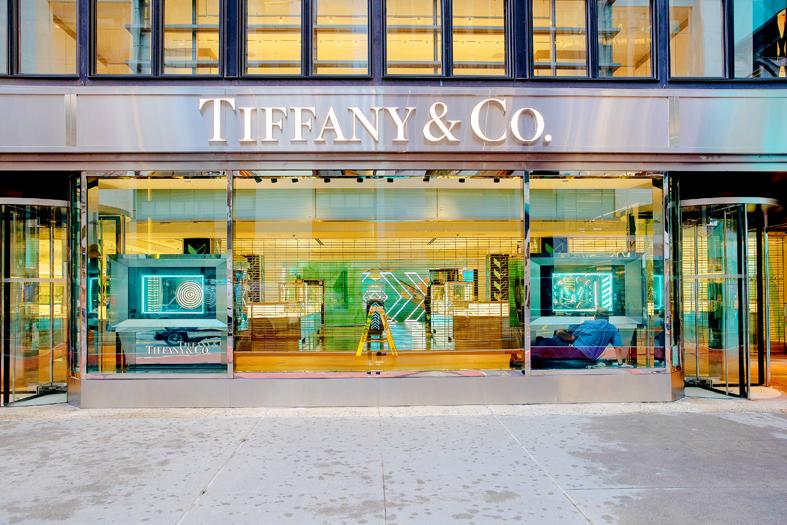LVMH Moet Hennessy Louis Vuitton SE’s first-quarter sales soared, sending the stock to a record and pointing to the luxury sector’s recovery from a COVID-19 pandemic-induced slump.
Revenue at the fashion and leather goods unit surged 52 percent on an organic basis from a year earlier, the company said on Tuesday.
Analysts had expected a 30 percent increase.

Photo: Bloomberg
Gains in China drove the “eye-popping organic growth,” said Francesca DiPasquantonio, an analyst at Deutsche Bank AG.
In a further sign of buoyancy, LVMH’s performance even topped the same period in 2019.
The company’s stock rose as much as 3.2 percent in Paris trading, reaching a record 613.9 euros.
LVMH’s fashion and leather goods division has been the key driver throughout the crisis, benefiting from the growth of the Christian Dior and Louis Vuitton brands.
Revenue in Asia excluding Japan jumped 86 percent on an organic basis from a year earlier, followed by the US, where revenue grew by 23 percent.
However, sales in Europe were still down 9 percent compared with last year.
With catwalks having gone virtual for most of the past year, Dior and Vuitton have tried to entice customers by showcasing collections in sumptuous locales such as the Chateau de Versailles through Instagram and other platforms.
In a sign of how much Asia has emerged from the pandemic, Dior unveiled its disco-inspired women’s ready-to-wear fall collection in Shanghai this week in front of a large audience.
That was in stark contrast to the situation in LVMH’s home country of France, which is amid a third lockdown as it approaches 100,000 COVID-19 fatalities.
First-quarter revenue at the luxury giant rose 30 percent on an organic basis to just under 14 billion euros (US$16.75 billion).
Analysts had expected 12.7 billion euros.
Despite the gloom in Europe — where most fashion stores remained closed at the start of this month — the company is experiencing a surge in demand from local clients, LVMH chief financial officer Jean-Jacques Guiony said during a call with analysts.
“It’s a very good signal, [but] not sufficient to offset the fact that tourists are gone,” Guiony said.
Tiffany & Co, which officially became part of LVMH in January, has experienced a “strong start” to the year, he said.
LVMH has increased prices on some of its silver products, Guiony said, adding that he expects the overhaul at the US jeweler to “take years” — notably for the distribution, merchandising and marketing of the brand.
“We know there’s a lot to be done within the next years and we’ll do it,” he said.

Semiconductor shares in China surged yesterday after Reuters reported the US had ordered chipmaking giant Taiwan Semiconductor Manufacturing Co (TSMC, 台積電) to halt shipments of advanced chips to Chinese customers, which investors believe could accelerate Beijing’s self-reliance efforts. TSMC yesterday started to suspend shipments of certain sophisticated chips to some Chinese clients after receiving a letter from the US Department of Commerce imposing export restrictions on those products, Reuters reported on Sunday, citing an unnamed source. The US imposed export restrictions on TSMC’s 7-nanometer or more advanced designs, Reuters reported. Investors figured that would encourage authorities to support China’s industry and bought shares

TECH WAR CONTINUES: The suspension of TSMC AI chips and GPUs would be a heavy blow to China’s chip designers and would affect its competitive edge Taiwan Semiconductor Manufacturing Co (TSMC, 台積電), the world’s biggest contract chipmaker, is reportedly to halt supply of artificial intelligence (AI) chips and graphics processing units (GPUs) made on 7-nanometer or more advanced process technologies from next week in order to comply with US Department of Commerce rules. TSMC has sent e-mails to its Chinese AI customers, informing them about the suspension starting on Monday, Chinese online news outlet Ijiwei.com (愛集微) reported yesterday. The US Department of Commerce has not formally unveiled further semiconductor measures against China yet. “TSMC does not comment on market rumors. TSMC is a law-abiding company and we are

FLEXIBLE: Taiwan can develop its own ground station equipment, and has highly competitive manufacturers and suppliers with diversified production, the MOEA said The Ministry of Economic Affairs (MOEA) yesterday disputed reports that suppliers to US-based Space Exploration Technologies Corp (SpaceX) had been asked to move production out of Taiwan. Reuters had reported on Tuesday last week that Elon Musk-owned SpaceX had asked their manufacturers to produce outside of Taiwan given geopolitical risks and that at least one Taiwanese supplier had been pushed to relocate production to Vietnam. SpaceX’s requests place a renewed focus on the contentious relationship Musk has had with Taiwan, especially after he said last year that Taiwan is an “integral part” of China, sparking sharp criticism from Taiwanese authorities. The ministry said

US President Joe Biden’s administration is racing to complete CHIPS and Science Act agreements with companies such as Intel Corp and Samsung Electronics Co, aiming to shore up one of its signature initiatives before US president-elect Donald Trump enters the White House. The US Department of Commerce has allocated more than 90 percent of the US$39 billion in grants under the act, a landmark law enacted in 2022 designed to rebuild the domestic chip industry. However, the agency has only announced one binding agreement so far. The next two months would prove critical for more than 20 companies still in the process